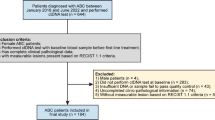Abstract
Many studies have examined the association between CD28 T > C polymorphism (rs3116496) and cancer risk in various populations. However, results remained controversial. To assess this relationship more precisely, a meta-analysis was performed. A comprehensive literature search was performed using the PubMed database for relevant articles published (updated to January 1, 2014). Odds ratios (ORs) and 95 % confidence intervals (CIs) were used to assess the strength of the association. A total of nine studies were selected for this meta-analysis, including 3,878 cases and 4,424 controls. The results indicated that CD28 T > C polymorphism (rs3116496) was not associated with the risk of cancer in overall population (CC + CT vs. TT, OR = 1.17, 95 %CI = 0.94–1.47, P H = 0.00; CC vs. CT + TT, OR = 1.26, 95 %CI = 0.92–1.73, P H = 0.86; CC vs. TT, OR = 1.27, 95 %CI = 0.92–1.74, P H = 0.85; CT vs. TT, OR = 1.15, 95 %CI = 0.91–1.46, P H = 0.00; and C vs. T, OR = 1.17, 95 %CI = 0.97–1.41, P H = 0.00). In subgroup analysis according to cancer type, no significant association was found in cervical cancer or other cancer. However, in the subgroup analysis by ethnicity, the significant risk was found among Asians (CC + CT vs. TT, OR = 1.51, 95 %CI = 1.24–1.83, P H = 0.05; C vs. T, OR = 1.46, 95 %CI = 1.22–1.74, P H = 0.11), but not among Caucasians. The result of this meta-analysis suggested that CD28 T > C polymorphism (rs3116496) may have an increased risk of cancer in Asians.



Similar content being viewed by others
References
Lesterhuis WJ, Haanen JB, Punt CJ. Cancer immunotherapy—revisited. Nat Rev Drug Discov. 2011;10:591–600.
Rudd CE, Taylor A, Schneider H. CD28 and CTLA-4 coreceptor expression and signal transduction. Immunol Rev. 2009;229:12–26.
Collins M, Ling V, Carreno BM. The B7 family of immune-regulatory ligands. Genome Biol. 2005;6:223.
Kim HJ, Chung JH, Kang S, Kim SK, Cho BS, Kim SD, et al. Association of CTLA4, CD28 and ICOS gene polymorphisms with clinicopathologic characteristics of childhood IgA nephropathy in Korean population. J Genet. 2011;90:151–5.
Hutloff A, Dittrich AM, Beier KC, Eljaschewitsch B, Kraft R, Anaqnostopoulos I, et al. ICOS is an inducible T-cell co-stimulator structurally and functionally related to CD28. Nature. 1999;397:263–6.
Yoshinaga SK, Whoriskey JS, Khare SD, Sarmiento U, Guo J, Horan T, et al. Tcell co-stimulation through B7RP-1 and ICOS. Nature. 1999;402:827–32.
Bouwhuis MG, Gast A, Figl A, Eggermont AM, Hemminki K, Schadendorf D, et al. Polymorphisms in the CD28/CTLA4/ICOS genes: role in malignant melanoma susceptibility and prognosis? Cancer Immunol Immunother. 2010;59:303–12.
Chen S, Zhang Q, Shen L, Liu Y, Xu F, Li D, et al. Investigation of CD28 gene polymorphisms in patients with sporadic breast cancer in a Chinese Han population in Northeast China. PLoS ONE. 2012;7:e48031.
Chen X, Li H, Qiao Y, Yu D, Guo H, Tan W, et al. Association of CD28 gene polymorphism with cervical cancer risk in a Chinese population. Int J Immunogenet. 2011;38:51–4.
Cheng TY, Lin JT, Chen LT, Shun CT, Wang HP, Lin MT, et al. Association of T-cell regulatory gene polymorphisms with susceptibility to gastric mucosa-associated lymphoid tissue lymphoma. J Clin Oncol. 2006;24:3483–9.
Dilmec F, Ozgonul A, Uzunkoy A, Akkafa F. Investigation of CTLA-4 and CD28 gene polymorphisms in a group of Turkish patients with colorectal cancer. Int J Immunogenet. 2008;35:317–21.
Ivansson EL, Juko-Pecirep I, Gyllensten UB. Interaction of immunological genes on chromosome 2q33 and IFNG in susceptibility to cervical cancer. Gynecol Oncol. 2010;116:544–8.
Karabon L, Pawlak E, Tomkiewicz A, Jedynak A, Passowicz-Muszynska E, Zajda K, et al. CTLA-4, CD28, and ICOS gene polymorphism associations with non-small-cell lung cancer. Hum Immunol. 2011;72:947–54.
Pawlak E, Karabon L, Wlodarska-Polinska I, Jedynak A, Jonkisz A, Tomkiewicz A, et al. Influence of CTLA-4/CD28/ICOS gene polymorphisms on the susceptibility to cervical squamous cell carcinoma and stage of differentiation in the Polish population. Hum Immunol. 2010;71:195–200.
Suwalska K, Pawlak E, Karabon L, Tomkiewicz A, Dobosz T, Urbaniak-Kujda D, et al. Association studies of CTLA-4, CD28, and ICOS gene polymorphisms with B-cell chronic lymphocytic leukemia in the Polish population. Hum Immunol. 2008;69:193–201.
Conflicts of interest
None
Author information
Authors and Affiliations
Corresponding authors
Rights and permissions
About this article
Cite this article
Cong, J., Zhang, S. & Gao, X. Quantitative assessment of the associations between CD28 T > C polymorphism (rs3116496) and cancer risk. Tumor Biol. 35, 9195–9200 (2014). https://doi.org/10.1007/s13277-014-2204-6
Received:
Accepted:
Published:
Issue Date:
DOI: https://doi.org/10.1007/s13277-014-2204-6




